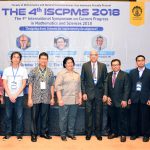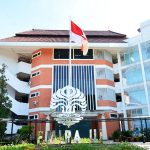This was continued from Blue Carbon Measurement Training, which part of Dugong and Seagrass Conservation Project (DSCP) in Indonesia, organized by Director of Conservation and Marine Biodiversity together with Marine Research Center-Ministry of Marine Affairs and Fisheries; Oceanography Research Center (Pusat Penelitian Oseanografi/P2O-LIPI), Marine and Fisheries Faculty-IPB also WWF-Indonesia. The training was held to be two parts, the first one was in Marine Research Center (P2O-LIPI) North Jakarta on October 16th and 17th 2018, and the rest was in Pari Island, Seribu Islands-Jakarta on October 18th and 19th 2018. The project had invited so many stakeholders, like governments, academicians, NGOs also business people.
Also read: Center For Marine Studies FMIPA UI Joined to Blue Carbon Measurement Training
Training and Management Coordinator of the Center for Marine Studies of FMIPA UI, Fika Afriyani has still participated in the project as one of the representations for academicians. Center for Marine Studies has a role to give some base education training not only for Universitas Indonesia students, especially in Mathematics and Science Faculty but also for another student by doing Youth Program. Youth Program is an annual program from the Center for Marine Studies which aims to give conservation education for the young generation (10-17 years old).
There’s still a lack of information or knowledge from a citizen about Dugong. Even sometimes it commons to know that Dugong can be eaten, same as another sea animal. So that it is important to know and spread the information about Dugong and it’s habitat, to raise awareness from citizens because Dugong status is already on the IUCN Red List of Threatened Species. The first thing that we need to know to protect Dugong is to conserve the seagrass bed as it’s habitat to eat. Seagrass is known as Dugong’s main food. This Dugong Project was focused on seagrass community structure training and also how to track Dugong’s existence by not only knowing the feeding trails but also by doing interviews with the villagers who live around coastal areas and by doing the mapping.
Saving Dugong is important to save the sustainability of the ecosystem because if there’s one disappeared from the ecosystem, there would be something wrong from the food chain. Both Dugong and humans are mammals and have a role in the food chain. The balance of the role of each population very important to save.






